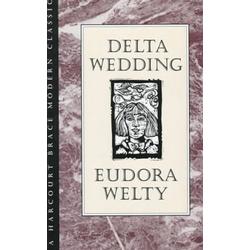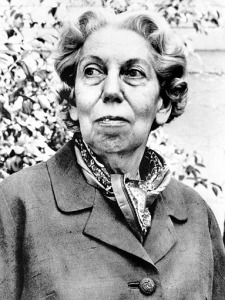It should come as no surprise that brides and grooms most often choose the summer months for their nuptials. How can you turn down sunshine and flowers and bright green grass? My two oldest and dearest friends are both getting married this summer, and as I celebrated my own anniversary in May, I feel as if weddings abound.
So when I happened upon Delta Wedding at a thrift store, I eagerly snatched it up, ready to delve even further into wedding fervor. I have long admired Eudora Welty; her sharp wit and vivid depiction of the South set her apart from many of her contemporaries. As I held Delta Wedding in my hands, I anticipated that this novel would only confirm my already high opinion.
In 1946, writing for the New York Times, Charles Poore aptly spoke of Ms. Welty, saying, "here was a new talent, sparkling and deep, combining the sensibility of Virginia Woolf's moody brilliance with an uncommon sense of the American realistic tradition. Miss Welty's stories go deep into the motives and moods and compulsions that move her characters--but you never doubt that they live and have their being not far from the streets of Jackson and the bayous and cotton fields of the Mississippi Delta country or Natchez country."
Indeed, Welty does seem to appreciate and emulate Virginia Woolf's vivid unpacking of ordinary life; Welty's prose is full of vivid images, clever banter and a slew of characters that float in and out of the narrative. But instead of musty England, Welty thrives in the deep South. In Delta Wedding, the reader is transported into the Fairchild clan, a long established cotton barony populated with a host of aunts, uncles, siblings and cousins.
Set in the 1920's, Delta Wedding presents the Fairchild family in all of their confusion and wonder. Letting the characters speak for themselves and the scenes play out uninterrupted, Eudora Welty plops the reader in the midst of wedding preparations. The various relationships and generations are thrown at the reader from the opening page, and you simply must trust that as you plod along, you will begin to untangle this sparkling web.
Because indeed this novel is full of brilliance. The characters are unique and somewhat absurd; they are real people undressed and exposed yet still trying to present themselves in the best possible light. It is evident that the Fairchilds have created their own world, with their own rules and preferences. By the end of the novel, you find yourself wanting to follow the family a bit longer, wanting to delve deeper into the various entanglements and endeavors of some of the more likable characters.


 RSS Feed
RSS Feed
